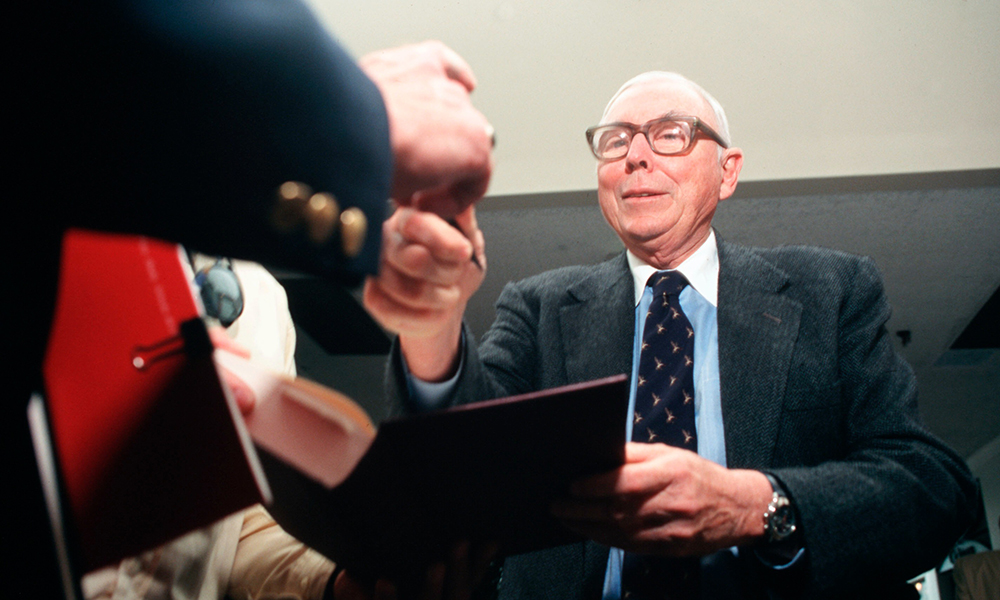
查理·芒格是独一无二的。上周,这位传奇投资者、伯克希尔·哈撒韦公司(Berkshire Hathaway)副董事长去世(享年99岁),使其无可比拟性比以往任何时候都更加突出。芒格逝世后,许多企业首席执行官和华尔街知名投资人士都认真思考这位传奇投资者带来的影响,并对其给予极高的赞誉,还分享了这位沃伦·巴菲特(Warren Buffett)的得力干将对他们和其他金融和投资界人士的意义。
为芒格致的悼词中最感人的一篇来自喜马拉雅资本(Himalaya Capital Management)创始人兼董事长李录。这家对冲基金以芒格式的纪律和价值导向投资而闻名。
他描述了芒格如何始终"坚持以最合乎道义的方式赚钱",只有在"如果立场互换,他会欣然采取相反的立场"的情况下才会参与交易。他谈到了芒格通过"终身学习"所获得的"智慧",以及他分享这种智慧的热情。他还强调,芒格虽然多次成为亿万富翁,但从未忘记始终如一、坚持不懈地与“家人、朋友、合作伙伴和边境世界进行有爱互动,"。
“他以理性指导人生,全无嫉妒、怨恨和自怜等心理缺陷。他以坚忍和冷静的态度锲而不舍地面对无数的逆境。”李录写道,并指出芒格“对象征成功的事物没什么兴趣,而是把他的财富用于有价值的事业,通常不知疲倦地以幽默的方式将他的世俗智慧传播给那些愿意倾听的人。”
幽默,尤其是在捍卫和教育普通人方面的幽默,无疑是芒格最喜欢的消遣方式之一。从抨击加密货币"部分是欺诈,部分是妄想",给财务顾问贴上"算命先生"的标签,到斥责企业会计发明的调整后收益统计数据——他将其称为"狗屁收益"。
芒格从不讳言。
对于李录来说,芒格强调道德投资,尤其是与他的同行相比,使他成为现代资本主义哲学家,他的教诲将世代相传。
现代儒家思想的化身
李录出生于中国唐山,曾在南京大学攻读经济学和物理学,上世90年代之后前往美国留学。
在哥伦比亚大学学习期间,他参加了巴菲特的演讲活动,从此改变了人生。在受到奥马哈先知(Oracle of Omaha)的启发后,他开始用自己的钱进行投资,并在创办自己的对冲基金之前,开始了企业融资的职业生涯。在取得一定的成功后,李录在2003年遇到了他的偶像芒格。芒格对李录印象深刻,将自己的部分财产投入到他的基金中,两人一直维持朋友关系,直到芒格生命的最后时刻。
李录在喜马拉雅资本网站上发表声明说:"作为一名投资者和个人,他对我产生了深远的影响,我对他的信任、支持和智慧感激不尽。”
在周四的悼词中,李录描述了芒格的投资理念,在国外引起了巨大反响。
芒格的自传《穷查理宝典:查理·芒格的智慧箴言录》(Poor Charlie’s Almanack: The Essential Wit and Wisdom of Charles T. Munger)的中文版在过去十年间在中国的销量超过120万册。李录解释说:"在中国,越来越多受过教育的人士将查理视为现代儒家思想的化身,他在接受资本主义市场力量的同时,仍保持着一种良善而开明的生活方式。”
随着中美紧张局势的加剧,李录认为,"假以时日,对中国的现代化进程以及中国如何与世界其他国家互动而言,现代儒学的愿景将变得至关重要"。
“查理的教诲将继续传播,激励并更加深刻地影响世界。这将是他永恒的遗产。”他写道。(财富中文网)
译者:中慧言-王芳
查理·芒格是独一无二的。上周,这位传奇投资者、伯克希尔·哈撒韦公司(Berkshire Hathaway)副董事长去世(享年99岁),使其无可比拟性比以往任何时候都更加突出。芒格逝世后,许多企业首席执行官和华尔街知名投资人士都认真思考这位传奇投资者带来的影响,并对其给予极高的赞誉,还分享了这位沃伦·巴菲特(Warren Buffett)的得力干将对他们和其他金融和投资界人士的意义。
为芒格致的悼词中最感人的一篇来自喜马拉雅资本(Himalaya Capital Management)创始人兼董事长李录。这家对冲基金以芒格式的纪律和价值导向投资而闻名。
他描述了芒格如何始终"坚持以最合乎道义的方式赚钱",只有在"如果立场互换,他会欣然采取相反的立场"的情况下才会参与交易。他谈到了芒格通过"终身学习"所获得的"智慧",以及他分享这种智慧的热情。他还强调,芒格虽然多次成为亿万富翁,但从未忘记始终如一、坚持不懈地与“家人、朋友、合作伙伴和边境世界进行有爱互动,"。
“他以理性指导人生,全无嫉妒、怨恨和自怜等心理缺陷。他以坚忍和冷静的态度锲而不舍地面对无数的逆境。”李录写道,并指出芒格“对象征成功的事物没什么兴趣,而是把他的财富用于有价值的事业,通常不知疲倦地以幽默的方式将他的世俗智慧传播给那些愿意倾听的人。”
幽默,尤其是在捍卫和教育普通人方面的幽默,无疑是芒格最喜欢的消遣方式之一。从抨击加密货币"部分是欺诈,部分是妄想",给财务顾问贴上"算命先生"的标签,到斥责企业会计发明的调整后收益统计数据——他将其称为"狗屁收益"。
芒格从不讳言。
对于李录来说,芒格强调道德投资,尤其是与他的同行相比,使他成为现代资本主义哲学家,他的教诲将世代相传。
现代儒家思想的化身
李录出生于中国唐山,曾在南京大学攻读经济学和物理学,上世90年代之后前往美国留学。
在哥伦比亚大学学习期间,他参加了巴菲特的演讲活动,从此改变了人生。在受到奥马哈先知(Oracle of Omaha)的启发后,他开始用自己的钱进行投资,并在创办自己的对冲基金之前,开始了企业融资的职业生涯。在取得一定的成功后,李录在2003年遇到了他的偶像芒格。芒格对李录印象深刻,将自己的部分财产投入到他的基金中,两人一直维持朋友关系,直到芒格生命的最后时刻。
李录在喜马拉雅资本网站上发表声明说:"作为一名投资者和个人,他对我产生了深远的影响,我对他的信任、支持和智慧感激不尽。”
在周四的悼词中,李录描述了芒格的投资理念,在国外引起了巨大反响。
芒格的自传《穷查理宝典:查理·芒格的智慧箴言录》(Poor Charlie’s Almanack: The Essential Wit and Wisdom of Charles T. Munger)的中文版在过去十年间在中国的销量超过120万册。李录解释说:"在中国,越来越多受过教育的人士将查理视为现代儒家思想的化身,他在接受资本主义市场力量的同时,仍保持着一种良善而开明的生活方式。”
随着中美紧张局势的加剧,李录认为,"假以时日,对中国的现代化进程以及中国如何与世界其他国家互动而言,现代儒学的愿景将变得至关重要"。
“查理的教诲将继续传播,激励并更加深刻地影响世界。这将是他永恒的遗产。”他写道。(财富中文网)
译者:中慧言-王芳
Charlie Munger was one of a kind. That was more evident than ever in the wake of the legendary investor and Berkshire Hathaway vice chairman’s death last week at age 99. A raft of corporate CEOs and renowned Wall Street investors reflected on—and lionized—Munger after his passing, sharing what the sharp-tongued, quick-witted right-hand man to Warren Buffett meant to them and others in finance and investing.
One of the most moving tributes to Munger came from Li Lu, founder and chairman of Himalaya Capital Management, a hedge fund known for its Munger-like discipline and value-oriented investing.
He described how Munger always “insisted on making money in the most morally sound way,” entering deals only when “if positions were reversed, he would comfortably take the other side.” He discussed the “wisdom” that Munger earned through his dedication to “lifelong learning,” and his passion for sharing that wisdom. And he emphasized that Munger, although a billionaire many times over, never forgot about consistently engaging with “family, friends, partners, and the border world with loving assiduousness.”
“He guided life with rationality devoid of mental deficiencies such as envy, resentment, and self-pity. He faced and persevered through countless adversities with stoicism and equanimity,” Lu wrote, noting that Munger “showed little appetite for the trappings of that success, and instead spent his wealth on worthy causes and tirelessly spread his worldly wisdom to those who would listen, often with humor.”
Humor, and particularly humor in defending and educating the everyman, was certainly one of Munger’s favorite pastimes. From ripping cryptocurrencies as “partly fraud and partly delusion” and labeling financial advisors “fortune tellers” to calling out corporate accountants for their invention of adjusted earnings statistics—which he labeled “bullsh*t earnings”
Munger never pulled his punches.
For Lu, Munger’s emphasis on investing with morality, especially compared to his peers, made him a sort of modern-day, capitalist philosopher—one whose lessons will be taught for generations to come.
The embodiment of modern-day Confucianism
Born in Tangshan, China, Lu studied economics and physics at the University of Nanjing University where he became one of the student leaders of the 1989 Tiananmen Square protest before leaving for the United States.
His life was forever changed after he heard Buffett give a talk while he was studying at Columbia University. He began investing his own money after being inspired by the Oracle of Omaha, and would go on to a career in corporate finance before founding his own hedge fund. After some success, Lu ended up meeting his idol, Munger, in 2003. Munger was so impressed with Lu that he invested some of his own fortune in his fund, and the two were friends until the end.
“He had a profound impact on me as an investor and individual, and I could not be more grateful for his trust, support, and wisdom,” Lu says in a statement on Himalaya Capital’s website.
In his eulogy on Thursday, Lu described how Munger’s ideas about investing—and how to conduct oneself morally in a capitalist system—have made a huge splash abroad.
The Mandarin language version of Munger’s autobiography, Poor Charlie’s Almanack: The Essential Wit and Wisdom of Charles T. Munger, has sold over 1.2 million copies in China over the past decade. “There, the educated class increasingly came to view Charlie as the embodiment of modern-day Confucianism, maintaining a virtuous and enlightened life while embracing the market forces of capitalism,” Lu explained.
And with China-U.S. tensions rising, Lu believes that “in time, that vision of modern Confucianism will be crucial for Chinese modernization and how China interacts with the rest of the world.”
“Charlie’s teachings will continue to spread, inspire, and impact the world even more profoundly. That will be his eternal legacy,” he wrote.






